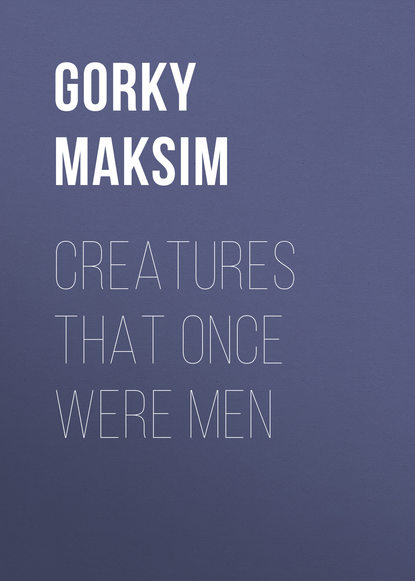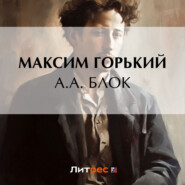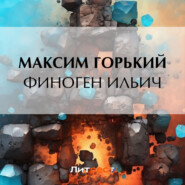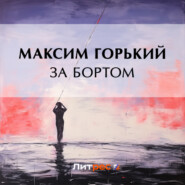По всем вопросам обращайтесь на: info@litportal.ru
(©) 2003-2025.
✖
Creatures That Once Were Men
Настройки чтения
Размер шрифта
Высота строк
Поля
My silence did not pass unnoticed by Shakro, who profited by it in his own fashion. His behavior toward me from that time grew more and more shameless. I worked, while he ate and drank and urged me on, refusing, on various pretexts, to do any work himself. I am no follower of Tolstoi. I felt amused and sad as I saw this strong healthy lad watching me with greedy eyes when I returned from a hard day's labor, and found him waiting for me in some shady nook. But it was even more mortifying to see that he was sneering at me for working. He sneered at me because he had learned to beg, and because he looked on me as a lifeless dummy. When he first started begging, he was ashamed for me to see him, but he soon got over this; and as soon as we came to some Tartar village, he would openly prepare for business. Leaning heavily on his stick, he would drag one foot after him, as though he were lame. He knew quite well that the Tartars were mean, and never give alms to anyone who is strong and well.
I argued with him, and tried to convince him of the shamefulness of such a course of action. He only sneered.
"I cannot work," was all he would reply.
He did not get much by his begging.
My health at that time began to give way. Every day the journey seemed to grow more trying. Every day our relations toward each other grew more strained. Shakro, now, had begun shamelessly to insist that I should provide him with food.
"It was you," he would say, "who brought me out here, all this way; so you must look after me. I never walked so far in my life before. I should never have undertaken such a journey on foot. It may kill me! You are tormenting me; you are crushing the life out of me! Think what it would be if I were to die! My mother would weep; my father would weep; all my friends would weep! Just think of all the tears that would be shed!"
I listened to such speeches, but was not angered by them. A strange thought began to stir in my mind, a thought that made me bear with him patiently. Many a time as be lay asleep by my side I would watch his calm, quiet face, and think to myself, as though groping after some idea:
"He is my fellow-traveller – my fellow-traveller."
At times, a dim thought would strike me, that after all Shakro was only right in claiming so freely, and with so much assurance, my help and my care. It proved that he possessed a strong will.
He was enslaving me, and I submitted, and studied his character; following each quivering movement of the muscles of his face, trying to foresee when and at what point he would stop in this process of exploiting another person's individuality.
Shakro was in excellent spirits; he sang, and slept, and jeered at me, when he felt so disposed. Sometimes we separated for two or three days. I would leave him some bread and some money (if we had any), and would tell him where to meet me again. At parting, he would follow me with a suspicious, angry look in his eyes. But when we met again he welcomed me with gleeful triumph. He always said, laughing: "I thought you had run off alone, and left me! ha! ha! ha!" I brought him food, and told him of the beautiful places I had seen; and once even, speaking of Bakhtchesarai, I told him about our Russian poet Pushkin, and recited some of his verses. But this produced no effect on him.
"Oh, indeed; that is poetry, is it? Well, songs are better than poetry, I knew a Georgian once! He was the man to sing! He sang so loud – so loud – he would have thought his throat was being cut? He finished by murdering an inn-keeper, and was banished to Siberia."
Every time I returned, I sank lower and lower in the opinion of Shakro, until he could not conceal his contempt for me. Our position was anything but pleasant. I was seldom lucky enough to earn more than a rouble or a rouble and a-half a week, and I need not say that was not nearly sufficient to feed us both.
The few bits of money that Shakro gained by begging made but little difference in the state of our affairs, for his belly was a bottomless pit, which swallowed everything that fell in its way; grapes, melons, salt fish, bread, or dried fruit; and as time went on he seemed to need ever more and more food.
Shakro began to urge me to hasten our departure from the Crimea, not unreasonably pointing out that autumn would soon be here and we had a long way still to go. I agreed with this view, and, besides, I had by then seen all that part of the Crimea. So we pushed on again toward Feodosia, hoping to earn something there. Once more our diet was reduced to fruit, and to hopes for the future.
Poor future! Such a load of hopes is cast on it by men, that it loses almost all its charms by the time it becomes the present!
When within some twenty versts of Aloushta we stopped, as usual, for our night's rest. I had persuaded Shakro to keep to the sea coast; it was a longer way round, but I longed to breathe the fresh sea breezes. We made a fire, and lay down beside it. The night was a glorious one. The dark green sea splashed against the rocks below; above us spread the majestic calm of the blue heavens, and around us sweet-scented trees and bushes rustled softly. The moon was rising, and the delicate tracery of the shadows, thrown by the tall, green plane trees, crept over the stones. Somewhere near a bird sang; its note was clear and bold. Its silvery trill seemed to melt into the air that was full of the soft, caressing splash of the waves. The silence that followed was broken by the nervous chirp of a cricket The fire burned bright, and its flames looked like a large bunch of red and yellow flowers. Flickering shadows danced gaily around us, as if exulting in their power of movement, in contrast with the creeping advance of the moon shadows. From time to time strange sounds floated through the air. The broad expanse of sea horizon seemed lost in immensity. In the sky overhead not a cloud was visible. I felt as if I were lying on the earth's extreme edge, gazing into infinite space, that riddle that haunts the soul. The majestic beauty of the night intoxicated me, while my whole being seemed absorbed in the harmony of its colors, its sounds, and its scents.
A feeling of awe filled my soul, a feeling as if something great were very near to me. My heart throbbed with the joy of life.
Suddenly, Shakro burst into loud laughter, "Ha! ha! ha!
How stupid your face does look! You've a regular sheep's head!
Ha! ha! ha!"
I started as though it were a sudden clap of thunder. But it was worse.
It was laughable, yes, but oh, how mortifying it was!
He, Shakro, laughed till the tears came. I was ready to cry, too, but from quite a different reason. A lump rose in my throat, and I could not speak. I gazed at him with wild eyes, and this only increased his mirth. He rolled on the ground, holding his sides. As for me, I could not get over the insult – for a bitter insult it was. Those – few, I hope – who will understand it, from having had a similar experience in their lives, will recall all the bitterness it left in their souls.
"Leave off!" I shouted, furiously.
He was startled and frightened, but he could not at once restrain his laughter. His eyes rolled, and his cheeks swelled as if about to burst. All at once he went off into a guffaw again. Then I rose and left him.
For some time I wandered about, heedless and almost unconscious of all that surrounded me, my whole soul consumed with the bitter pang of loneliness and of humiliation. Mentally, I had been embracing all nature. Silently, with the passionate love any man must feel if he has a little of the poet in him, I was loving and adoring her. And now it was nature that, under the form of Shakro, was mocking me for my passion. I might have gone still further in my accusations against nature, against Shakro, and against the whole of life, had I not been stopped by approaching footsteps.
"Do not be angry," said Shakro in a contrite voice, touching my shoulder lightly. "Were you praying?' I didn't know it, for I never pray myself."
He spoke timidly, like a naughty child. In spite of my excitement, I could not help noticing his pitiful face ludicrously distorted by embarrassment and alarm.
"I will never interfere with you again. Truly! Never!" He shook his head emphatically. "I know you are a quiet fellow. You work hard, and do not force me to do the same. I used to wonder why; but, of course, it's because you are foolish as a sheep!"
That was his way of consoling me! That was his idea of asking for forgiveness! After such consolation, and such excuses, what was there left for me to do but forgive, not only for the past, but for the future!
Half an hour later he was sound asleep, while I sat beside him, watching him. During sleep, every one, be he ever so strong, looks helpless and weak, but Shakro looked a pitiful creature. His thick, half-parted lips, and his arched eyebrows, gave to his face a childish look of timidity and of wonder. His breathing was quiet and regular, though at times he moved restlessly, and muttered rapidly in the Georgian language; the words seemed those of entreaty. All around us reigned that intense calm which always makes one somehow expectant, and which, were it to last long, might drive one mad by its absolute stillness and the absence of sound – the vivid shadow of motion, for sound and motion seem ever allied.
The soft splash of the waves did not reach us. We were resting in a hollow gorge that was overgrown with bushes, and looked like the shaggy mouth of some petrified monster. I still watched Shakro, and thought: "This is my fellow traveler. I might leave him here, but I could never get away from him, or the like of him; their name is legion. This is my life companion. He will leave me only at death's door."
CHAPTER V
At Feodosia we were sorely disappointed. All work there was already apportioned among Turks, Greeks, Georgians, tramps, and Russian peasants from Poltava and Smolensk, who had all arrived before us. Already, more than four hundred men had, like ourselves, come in the hopes of finding employment; and were also, like ourselves, destined to remain silent spectators of the busy work going on in the port.
In the town, and outside also, we met groups of famished peasants, gray and careworn, wandering miserably about. Of tramps there were also plenty, roving around like hungry wolves.
At first these tramps took us for famished peasants, and tried to make what they could out of us. They tore from Shakro's back the overcoat which I had bought him, and they snatched my knapsack from my shoulders. After several discussions, they recognized our intellectual and social kinship with them; and they returned all our belongings. Tramps are men of honor, though they may be great rogues.
Seeing that there was no work for us, and that the construction of the harbor was going on very well without our help, we moved on resentfully toward Kertch.
My friend kept his word, and never again molested me; but he was terribly famished, his countenance was as black as thunder. He ground his teeth together, as does a wolf, whenever he saw someone else eating; and he terrified me by the marvellous accounts of the quantity of food he was prepared to consume. Of late he had begun to talk about women, at first only casually, with sighs of regret. But by degrees he came to talk more and more often on the subject, with the lascivious smile of "an Oriental." At length his state became such, that he could not see any person of the other sex, whatever her age or appearance, without letting fall some obscene remark about her looks or her figure.
He spoke of women so freely, with so wide a knowledge of the sex; and his point of view, when discussing women, was so astoundingly direct, that his conversation filled me with disgust. Once I tried to prove to him that a woman was a being in no way inferior to him. I saw that he was not merely mortified by my words, but was on the point of violently resenting them as a personal insult. So I postponed my arguments till such time as Shakro should be well fed once more.
In order to shorten our road to Kertch we left the coast, and tramped across the steppes. There was nothing in my knapsack but a three-pound loaf of barley bread, which we had bought of a Tartar with our last five-kopeck piece. Owing to this painful circumstance, when, at last we reached Kertch, we could hardly move our legs, so seeking therefore work was out of the question. Shakro's attempts to beg by the way had proved unsuccessful; everywhere he had received the curt refusal: "There are so many of you."
This was only too true, for the number of people, who, during that bitter year, were in want of bread, was appalling. The famished peasants roamed about the country in groups, from three to twenty or more together. Some carried babies in their arms; some had young children dragging by the hand. The children looked almost transparent, with a bluish skin, under which flowed, instead of pure blood, some sort of thick unwholesome fluid. The way their small sharp bones projected from under the wasted flesh spoke more eloquently than could any words. The sight of them made one's heart ache, while a constant intolerable pain seemed to gnaw one's very soul.
These hungry, naked, worn-out children did not even cry. But they looked about them with sharp eyes that flashed greedily whenever they saw a garden, or a field, from which the corn had not yet been carried. Then they would glance sadly at their elders, as if asking "Why was I brought into this world?"
Sometimes they had a cart driven by a dried-up skeleton of an old woman, and full of children, whose little heads peeped out, gazing with mournful eyes in expressive silence at the new land into which they had been brought. The rough, bony horse dragged itself along, shaking its head and its tumbled mane wearily from side to side.
Following the cart, or clustering round it, came the grown-up people, with heads sunk low on their breasts, and arms hanging helplessly at their sides. Their dim, vacant eyes had not even the feverish glitter of hunger, but were full of an indescribable, impressive mournfulness. Cast out of their homes by misfortune, these processions of peasants moved silently, slowly, stealthily through the strange land, as if afraid that their presence might disturb the peace of the more fortunate inhabitants. Many and many a time we came across these processions, and every time they reminded me of a funeral without the corpse.
Sometimes, when they overtook us, or when we passed them, they would timidly and quietly ask us: "Is it much farther to the village?"
And when we answered, they would sigh, and gaze dumbly at us.
My travelling companion hated these irrepressible rivals for charity.
In spite of all the difficulties of the journey, and the scantiness of our food, Shakro, with his rich vitality, could not acquire the lean, hungry look, of which the starving peasants could boast in its fullest perfection. Whenever he caught sight, in the distance, of these latter, he would exclaim: "Pouh! pouh! pouh. Here they are again! What are they roaming about for? They seem to be always on the move! Is Russia too small for them? I can't understand what they want! Russians are a stupid sort of people!"
When I had explained to him the reason of the "stupid" Russians coming to the Crimea, he shook his head incredulously, and remarked: "I don't understand! It's nonsense! We never have such 'stupid' things happening in Georgia!"
I argued with him, and tried to convince him of the shamefulness of such a course of action. He only sneered.
"I cannot work," was all he would reply.
He did not get much by his begging.
My health at that time began to give way. Every day the journey seemed to grow more trying. Every day our relations toward each other grew more strained. Shakro, now, had begun shamelessly to insist that I should provide him with food.
"It was you," he would say, "who brought me out here, all this way; so you must look after me. I never walked so far in my life before. I should never have undertaken such a journey on foot. It may kill me! You are tormenting me; you are crushing the life out of me! Think what it would be if I were to die! My mother would weep; my father would weep; all my friends would weep! Just think of all the tears that would be shed!"
I listened to such speeches, but was not angered by them. A strange thought began to stir in my mind, a thought that made me bear with him patiently. Many a time as be lay asleep by my side I would watch his calm, quiet face, and think to myself, as though groping after some idea:
"He is my fellow-traveller – my fellow-traveller."
At times, a dim thought would strike me, that after all Shakro was only right in claiming so freely, and with so much assurance, my help and my care. It proved that he possessed a strong will.
He was enslaving me, and I submitted, and studied his character; following each quivering movement of the muscles of his face, trying to foresee when and at what point he would stop in this process of exploiting another person's individuality.
Shakro was in excellent spirits; he sang, and slept, and jeered at me, when he felt so disposed. Sometimes we separated for two or three days. I would leave him some bread and some money (if we had any), and would tell him where to meet me again. At parting, he would follow me with a suspicious, angry look in his eyes. But when we met again he welcomed me with gleeful triumph. He always said, laughing: "I thought you had run off alone, and left me! ha! ha! ha!" I brought him food, and told him of the beautiful places I had seen; and once even, speaking of Bakhtchesarai, I told him about our Russian poet Pushkin, and recited some of his verses. But this produced no effect on him.
"Oh, indeed; that is poetry, is it? Well, songs are better than poetry, I knew a Georgian once! He was the man to sing! He sang so loud – so loud – he would have thought his throat was being cut? He finished by murdering an inn-keeper, and was banished to Siberia."
Every time I returned, I sank lower and lower in the opinion of Shakro, until he could not conceal his contempt for me. Our position was anything but pleasant. I was seldom lucky enough to earn more than a rouble or a rouble and a-half a week, and I need not say that was not nearly sufficient to feed us both.
The few bits of money that Shakro gained by begging made but little difference in the state of our affairs, for his belly was a bottomless pit, which swallowed everything that fell in its way; grapes, melons, salt fish, bread, or dried fruit; and as time went on he seemed to need ever more and more food.
Shakro began to urge me to hasten our departure from the Crimea, not unreasonably pointing out that autumn would soon be here and we had a long way still to go. I agreed with this view, and, besides, I had by then seen all that part of the Crimea. So we pushed on again toward Feodosia, hoping to earn something there. Once more our diet was reduced to fruit, and to hopes for the future.
Poor future! Such a load of hopes is cast on it by men, that it loses almost all its charms by the time it becomes the present!
When within some twenty versts of Aloushta we stopped, as usual, for our night's rest. I had persuaded Shakro to keep to the sea coast; it was a longer way round, but I longed to breathe the fresh sea breezes. We made a fire, and lay down beside it. The night was a glorious one. The dark green sea splashed against the rocks below; above us spread the majestic calm of the blue heavens, and around us sweet-scented trees and bushes rustled softly. The moon was rising, and the delicate tracery of the shadows, thrown by the tall, green plane trees, crept over the stones. Somewhere near a bird sang; its note was clear and bold. Its silvery trill seemed to melt into the air that was full of the soft, caressing splash of the waves. The silence that followed was broken by the nervous chirp of a cricket The fire burned bright, and its flames looked like a large bunch of red and yellow flowers. Flickering shadows danced gaily around us, as if exulting in their power of movement, in contrast with the creeping advance of the moon shadows. From time to time strange sounds floated through the air. The broad expanse of sea horizon seemed lost in immensity. In the sky overhead not a cloud was visible. I felt as if I were lying on the earth's extreme edge, gazing into infinite space, that riddle that haunts the soul. The majestic beauty of the night intoxicated me, while my whole being seemed absorbed in the harmony of its colors, its sounds, and its scents.
A feeling of awe filled my soul, a feeling as if something great were very near to me. My heart throbbed with the joy of life.
Suddenly, Shakro burst into loud laughter, "Ha! ha! ha!
How stupid your face does look! You've a regular sheep's head!
Ha! ha! ha!"
I started as though it were a sudden clap of thunder. But it was worse.
It was laughable, yes, but oh, how mortifying it was!
He, Shakro, laughed till the tears came. I was ready to cry, too, but from quite a different reason. A lump rose in my throat, and I could not speak. I gazed at him with wild eyes, and this only increased his mirth. He rolled on the ground, holding his sides. As for me, I could not get over the insult – for a bitter insult it was. Those – few, I hope – who will understand it, from having had a similar experience in their lives, will recall all the bitterness it left in their souls.
"Leave off!" I shouted, furiously.
He was startled and frightened, but he could not at once restrain his laughter. His eyes rolled, and his cheeks swelled as if about to burst. All at once he went off into a guffaw again. Then I rose and left him.
For some time I wandered about, heedless and almost unconscious of all that surrounded me, my whole soul consumed with the bitter pang of loneliness and of humiliation. Mentally, I had been embracing all nature. Silently, with the passionate love any man must feel if he has a little of the poet in him, I was loving and adoring her. And now it was nature that, under the form of Shakro, was mocking me for my passion. I might have gone still further in my accusations against nature, against Shakro, and against the whole of life, had I not been stopped by approaching footsteps.
"Do not be angry," said Shakro in a contrite voice, touching my shoulder lightly. "Were you praying?' I didn't know it, for I never pray myself."
He spoke timidly, like a naughty child. In spite of my excitement, I could not help noticing his pitiful face ludicrously distorted by embarrassment and alarm.
"I will never interfere with you again. Truly! Never!" He shook his head emphatically. "I know you are a quiet fellow. You work hard, and do not force me to do the same. I used to wonder why; but, of course, it's because you are foolish as a sheep!"
That was his way of consoling me! That was his idea of asking for forgiveness! After such consolation, and such excuses, what was there left for me to do but forgive, not only for the past, but for the future!
Half an hour later he was sound asleep, while I sat beside him, watching him. During sleep, every one, be he ever so strong, looks helpless and weak, but Shakro looked a pitiful creature. His thick, half-parted lips, and his arched eyebrows, gave to his face a childish look of timidity and of wonder. His breathing was quiet and regular, though at times he moved restlessly, and muttered rapidly in the Georgian language; the words seemed those of entreaty. All around us reigned that intense calm which always makes one somehow expectant, and which, were it to last long, might drive one mad by its absolute stillness and the absence of sound – the vivid shadow of motion, for sound and motion seem ever allied.
The soft splash of the waves did not reach us. We were resting in a hollow gorge that was overgrown with bushes, and looked like the shaggy mouth of some petrified monster. I still watched Shakro, and thought: "This is my fellow traveler. I might leave him here, but I could never get away from him, or the like of him; their name is legion. This is my life companion. He will leave me only at death's door."
CHAPTER V
At Feodosia we were sorely disappointed. All work there was already apportioned among Turks, Greeks, Georgians, tramps, and Russian peasants from Poltava and Smolensk, who had all arrived before us. Already, more than four hundred men had, like ourselves, come in the hopes of finding employment; and were also, like ourselves, destined to remain silent spectators of the busy work going on in the port.
In the town, and outside also, we met groups of famished peasants, gray and careworn, wandering miserably about. Of tramps there were also plenty, roving around like hungry wolves.
At first these tramps took us for famished peasants, and tried to make what they could out of us. They tore from Shakro's back the overcoat which I had bought him, and they snatched my knapsack from my shoulders. After several discussions, they recognized our intellectual and social kinship with them; and they returned all our belongings. Tramps are men of honor, though they may be great rogues.
Seeing that there was no work for us, and that the construction of the harbor was going on very well without our help, we moved on resentfully toward Kertch.
My friend kept his word, and never again molested me; but he was terribly famished, his countenance was as black as thunder. He ground his teeth together, as does a wolf, whenever he saw someone else eating; and he terrified me by the marvellous accounts of the quantity of food he was prepared to consume. Of late he had begun to talk about women, at first only casually, with sighs of regret. But by degrees he came to talk more and more often on the subject, with the lascivious smile of "an Oriental." At length his state became such, that he could not see any person of the other sex, whatever her age or appearance, without letting fall some obscene remark about her looks or her figure.
He spoke of women so freely, with so wide a knowledge of the sex; and his point of view, when discussing women, was so astoundingly direct, that his conversation filled me with disgust. Once I tried to prove to him that a woman was a being in no way inferior to him. I saw that he was not merely mortified by my words, but was on the point of violently resenting them as a personal insult. So I postponed my arguments till such time as Shakro should be well fed once more.
In order to shorten our road to Kertch we left the coast, and tramped across the steppes. There was nothing in my knapsack but a three-pound loaf of barley bread, which we had bought of a Tartar with our last five-kopeck piece. Owing to this painful circumstance, when, at last we reached Kertch, we could hardly move our legs, so seeking therefore work was out of the question. Shakro's attempts to beg by the way had proved unsuccessful; everywhere he had received the curt refusal: "There are so many of you."
This was only too true, for the number of people, who, during that bitter year, were in want of bread, was appalling. The famished peasants roamed about the country in groups, from three to twenty or more together. Some carried babies in their arms; some had young children dragging by the hand. The children looked almost transparent, with a bluish skin, under which flowed, instead of pure blood, some sort of thick unwholesome fluid. The way their small sharp bones projected from under the wasted flesh spoke more eloquently than could any words. The sight of them made one's heart ache, while a constant intolerable pain seemed to gnaw one's very soul.
These hungry, naked, worn-out children did not even cry. But they looked about them with sharp eyes that flashed greedily whenever they saw a garden, or a field, from which the corn had not yet been carried. Then they would glance sadly at their elders, as if asking "Why was I brought into this world?"
Sometimes they had a cart driven by a dried-up skeleton of an old woman, and full of children, whose little heads peeped out, gazing with mournful eyes in expressive silence at the new land into which they had been brought. The rough, bony horse dragged itself along, shaking its head and its tumbled mane wearily from side to side.
Following the cart, or clustering round it, came the grown-up people, with heads sunk low on their breasts, and arms hanging helplessly at their sides. Their dim, vacant eyes had not even the feverish glitter of hunger, but were full of an indescribable, impressive mournfulness. Cast out of their homes by misfortune, these processions of peasants moved silently, slowly, stealthily through the strange land, as if afraid that their presence might disturb the peace of the more fortunate inhabitants. Many and many a time we came across these processions, and every time they reminded me of a funeral without the corpse.
Sometimes, when they overtook us, or when we passed them, they would timidly and quietly ask us: "Is it much farther to the village?"
And when we answered, they would sigh, and gaze dumbly at us.
My travelling companion hated these irrepressible rivals for charity.
In spite of all the difficulties of the journey, and the scantiness of our food, Shakro, with his rich vitality, could not acquire the lean, hungry look, of which the starving peasants could boast in its fullest perfection. Whenever he caught sight, in the distance, of these latter, he would exclaim: "Pouh! pouh! pouh. Here they are again! What are they roaming about for? They seem to be always on the move! Is Russia too small for them? I can't understand what they want! Russians are a stupid sort of people!"
When I had explained to him the reason of the "stupid" Russians coming to the Crimea, he shook his head incredulously, and remarked: "I don't understand! It's nonsense! We never have such 'stupid' things happening in Georgia!"

















